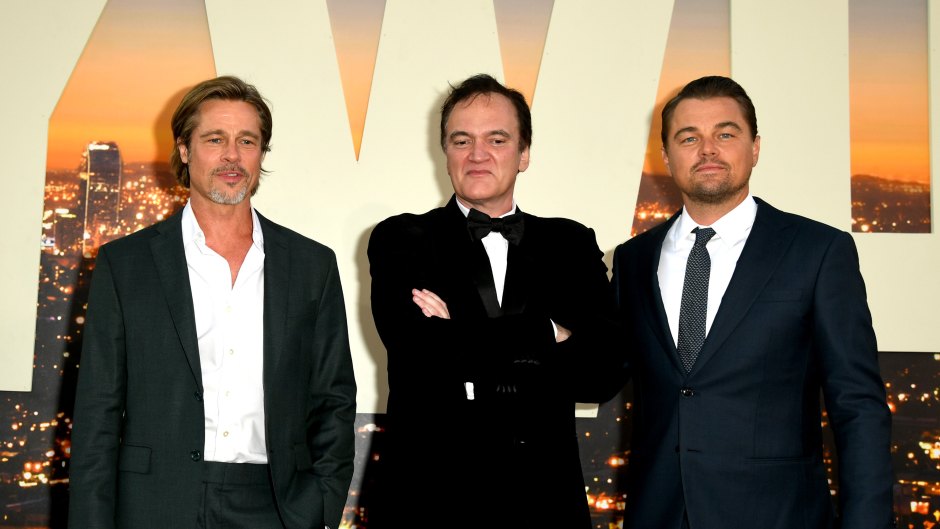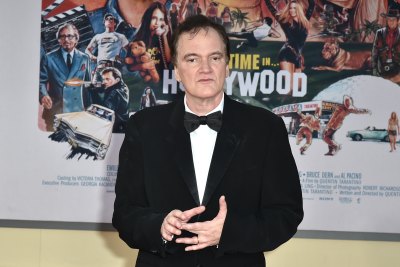
Kevin Winter/Getty Images
Your Behind-the-Scenes Guide to Quentin Tarantino Movies — From ‘Reservoir Dogs’ to ‘Once Upon a Time in Hollywood’
The release of any Quentin Tarantino film is considered an event, but with his latest effort, Once Upon a Time … in Hollywood — between its cast (which includes Leonardo DiCaprio and Brad Pitt on their first on-screen pairing) and its backdrop (the Manson murders of, among others, actress Sharon Tate) — it sounds like it’s going to be unique even for the controversial filmmaker.
The setting is 1969 Los Angeles at a point where not only is society changing, but so is Hollywood. Leonardo is TV star Rick Dalton and Brad is his longtime stunt double Cliff Booth. Both are doing their best to survive in an industry they barely recognize. It is, of course, an industry that Tarantino has loved his entire life and for which he has crafted one of the most unique bodies of works that ever seen from a director.
“Once Upon a Time in … Hollywood has been heavily advertised as Quentin Tarantino’s ninth movie,” observes film historian and author Dale Sherman, whose credits include Quentin Tarantino FAQ: Everything Left to Know About the Original Reservoir Dog and John Waters FAQ: All That’s Left to Know About the Provocateur of Bad Taste. “We read that and we either note it — because there have been stories for years about him only making 10 movies, and we’re getting close to the end — or we simply dismiss it, because we’re so used to being told that his newest movie is ‘number something’ out of all his movies. Is such numbering pretentious? Perhaps. But can you name another popular director that it was felt giving such designations would be worthy of advertising space? And that we accept that he probably wanted it advertised that way? We can love it or hate it, but either way we accept it, because that’s just the way we know Tarantino is going to roll when it comes to his movies.”
He notes that Tarantino is a rarity in Hollywood due to the fact that he has essentially attacked and ripped apart the action genre (whether in the form of Westerns, war flicks or crime dramas) and reinvent it in such a way that his iconoclastic deviations have come iconic in themselves.
“So often today we see a new action movie and compare it to what he has done; or see glimpses of his work in other people’s films. We sit there and go, ‘Oh, that’s something like Tarantino,’ and even ‘Ah, they’re trying to avoid being compared to Tarantino here.’ Like it or not, out of nine films in close to 30 years, Tarantino has been at the forefront (along with a handful of other filmmakers) of those who have changed our way of thinking and our acceptance of what we see in movies in general. His films are unique. You may feel you’ll know what you’ll see — and there are aspects of his work that can be seen as a thread throughout his body of work, as we’ll be discussing here — but you know that a Tarantino movie is always going to be a special event and rarely predictable.”

As to Once Upon a Time … in Hollywood, he notes that, like Tarantino’s previous work, it will exist in a world slightly out of focus with our reality and with characters reflected in shattered fun-house mirrors. “Obviously from just the ads,” he points out, “the movie will be a form of love-letter to Hollywood of the late 1960s and featuring the type of characters we expect from Tarantino. The film has already been praised highly by a number of critics and viewers; some even going so far as to suggest that it is a return to form for Tarantino, while ignoring the fact that his past two movies won three Academy Awards (including one to Tarantino for best screenplay on Django Unchained). No doubt, Once Upon a Time in … Hollywood will prove to be just as powerful as his earlier films. Yet even with the tidbits we have been shown, Tarantino continues his personal journey through celluloid.”
To better understand and enjoy this, his ninth movie, you can take a look at Quentin Tarantino’s earlier films by scrolling down.

Live Entertainment

Live Entertainment

Miramax

Miramax

Miramax

Miramax

Miramax

Kevin Winter/Getty Images

Dimension Films

Dimension Films

Universal Pictures

The Weinstein Company

The Weinstein Company

Weinstein Company

Columbia Pictures

Columbia Pictures








































